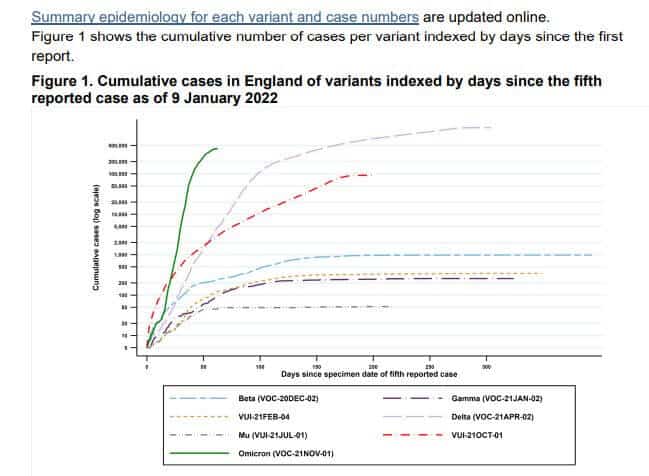Omicron began to spread rapidly in the UK about six weeks ago. So there is now substantial data available about the nature of the new variant.
Because the number of positive coronavirus tests may be an undercount due to lack of availability, the Office of National Statistics in the UK organises for a random sample of people to be swabbed each week. Their data suggest 1 in every 15 people in England have COVID.
There are roughly three times as many daily cases as during the delta peak this time last year. Yet despite the record total cases, hospitalisation is roughly half what it was at that time.
The symptom picture is slightly different between omicron and delta. Omicron is more likely to cause a fever or cough and less likely to cause headaches or loss of taste or smell.
Most importantly, omicron does appear to be flattening out quite rapidly as England approaches 500,000 total omicron cases. It’s too early to say whether this will morph into an extended case number increase, as occurred with delta.

Vaccine Effectiveness
Some have described the omicron variant as producing more “mild” sickness than previous variants. Yet this is mostly the result of immune protection from vaccination or prior infection.
A South African study recently found that omicron is less severe than delta even for the unvaccinated. But only about 25% of the difference was accounted for by the variant itself, rather than vaccination status.
Indeed, omicron is dodging the protection provided by vaccines much more than delta. Vaccine-induced protection against “mild” symptomatic infection with omicron “has largely disappeared by 20 weeks after vaccination” with an mRNA vaccine (i.e. Pfizer or Moderna). Following a booster, protection rises to 65-70%, before dropping below 50% after 10 weeks.
Yet the long-term “T-cell” immunity – and therefore protection against severe disease and hospitalisation – remains high. Protection against hospitalisation is 92% in the weeks after a booster and remains at 83% after 10 weeks. This has stopped the UK health system collapsing under record daily case numbers.
Omicron in children
“Young children and babies are proportionally more likely to be hospitalised with Omicron compared to older children than with previous variants,” Reuters reported last Friday. The study the report was based upon found the increase was centred on infants under 1 year.
New Scientist, suggested that this was mostly due to lack of vaccination. In other words, the proportion of severe illness in infants is rising because of vaccinations for children over the age of 5.
Follow Christian on Twitter for more news updates.